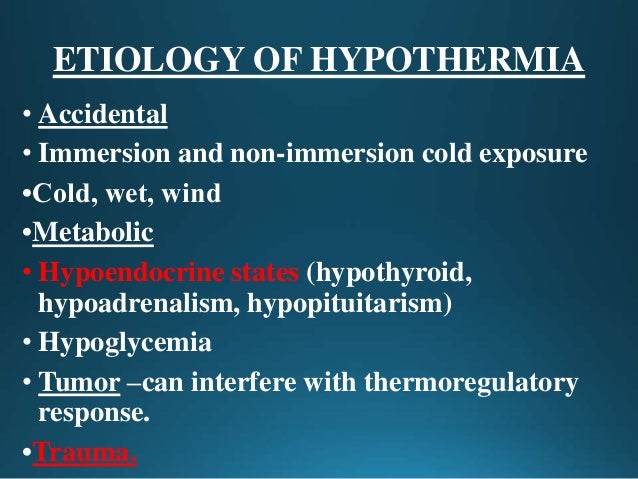
Hypothermia In Trauma Patients. In several studies on severe trauma injury hypothermia has been reported as occurring in up to two third of the patients 1. Rapid recognition and aggressive intervention is necessary to prevent organ failure and death. Physicians commonly ignore hypothermia an often-underappreciated event associated with mortality in trauma patients in general due to its prevalence and belief that it is secondary to the injury itself secondary hypothermia. On the other hand this could lead to increased bleeding risk and.

Mortality was twice as high 53 in patients with a Core Body Temperature. Spontaneous hypothermia following trauma has severely deleterious consequences for the trauma victim. The effects of hypothermia on coagulation may represent a two-edged sword in patients with acute brain injury who are treated with therapeutic cooling. Hypothermia in trauma patients is caused by a multitude of factors. Hypothermia is a common finding in the trauma patient and contributes to increased morbidity and mortality in this group of critically ill patients. Hypothermia along with acidosis and coagulopathy has been identified as a component.
Hypothermia is a disorder that causes catastrophic dysfunction in the bodys regulation of homeostasis.
Hypothermia is associated with aggravated injury and increased mortality 2 3. Mortality was twice as high 53 in patients with a Core Body Temperature. Although initial temperatures may be normal decreases in core temperatures during the course of initial evaluation and resuscitation are common. Uncontrollable hemorrhage often compounded by coagulopathy is the most frequent cause of early death in these patients. Spontaneous hypothermia following trauma has severely deleterious consequences for the trauma victim. 66 of Trauma patients become hypothermic and almost all patients suffer a drop in core temperature.